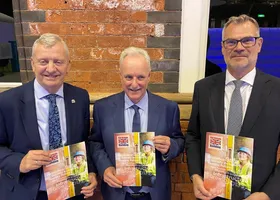Inclusive Growth
Economy
 In 2018 the contribution of construction to the UK economy was £117 billion, some 6%, and in Q2 accounted for 2.4 million jobs directly related to the industry, 7% of UK total (source: House of Commons Briefing Paper Number 01432, 16 December 2019).
In 2018 the contribution of construction to the UK economy was £117 billion, some 6%, and in Q2 accounted for 2.4 million jobs directly related to the industry, 7% of UK total (source: House of Commons Briefing Paper Number 01432, 16 December 2019).
Additionally, construction product manufacturing, which is not included in figures presented for the industry, in 2018 had a turnover of £61.2 billion – 10.7% of manufacturing – and was worth 36.2% of overall construction output as well as providing employment to 373,000 people (source: Construction Products Association) Around 80% of materials used in building new homes in England is manufactured in the UK.
Construction and its material supply-chain is an essential prerequisite to the built environment that allows society to enjoy every aspect of daily life including homes, health, work, recreation, and transport. It is a significant part of the UK economy and employment.
Global Britain should urgently capitalise on the ‘multiplier effect’ of investment in UK construction to create prosperity, jobs, economic growth as well as rebalancing and ‘levelling-up’ of regions across the United Kingdom.
Made in Britain
Increased use of domestically produced masonry would reduce the UK’s £10.8billion building materials trading deficit. It is therefore crucial to ensure that any future trade deals focus on inward investment to expand the UK building materials manufacturing capacity in the UK. In the speculative housing model, speed of build is determined by purchaser demand and will flex to ensure home builders do not carry large amounts of finished stock. The mantra has to be on quality and value rather than speed and cost reduction.The Importance of SMEs
SME construction related businesses who represent 99.6% of the industry will play a critical part in recruiting and developing the skilled workers we urgently need to deliver a high quality built environment. Assistance with employment and training costs, improved and simplified access to publicly funded projects and prompt payment will unlock the additional capacity and help to rebalance our economy.
Inward Investment
The Government has a key role to play in creating the right economic and regulatory environment to attract inward investment. This includes removing barriers to enterprise the creation of longterm sustainable growth. Housing is an essential strand of infrastructure priority for the Government. This will secure the economic and environmental gains that are vital to re-energising the UK economy. The focus needs to be on whole-life valueof the built environment rather than driving a race to the bottom.
Manufacturing and Distribution
Manufacturers and distributors of construction products and materials directly provide employment for at least 373,000 people across almost 24,000 companies, overwhelmingly based in the UK, with a combined annual turnover of over £62.1 billion (source: CPA).The Industrial Strategy focuses on the automotive and aerospace industries but tends to ignore the value and contribution of building materials manufacture. Current Government policy directly supports through grants and funding criteria a move away from UK manufactured materials to offsite and modular homes where the raw materials are almost all imported.
The lack of a ‘level playing field’ will actively undermine global investment to replace and enhance manufacturing capacity for UK produced construction materials. This will result in the long-term demise of a very important industry and the loss of the multiplier effect to the economy.




















































